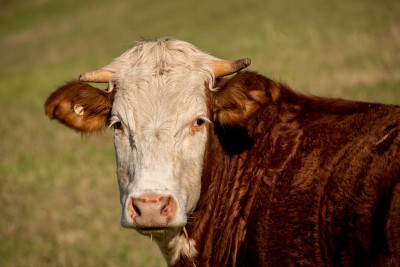When it the Right Time to Castrate Bulls by Jeff Robe

When is the right time to castrate bulls?
Jeff Robe, Oklahoma Quality Beef Network Coordinator
The practice of castrating animals goes back to ancient times. Egyptian farmers found castrating bovine bulls made the animal much easier to handle. It's doubtful the Egyptians were concerned about the value-added components of their animals. But today, adding value to market cattle is the name of the game and castration is a key component to any preconditioning program that can greatly influence market price premiums or discounts, especially in older bull calves.
Castrating bull calves has become common practice in U.S. beef herds. In 2017, the USDA-APHIS NAHMS Beef Cow Calf study indicated that 62% of commercial cow-calf herds used castration methods in their management practices. Castration has provided economic benefits to both the cow-calf producer and feedlot operators through increased market prices and meat quality. Castration also decreases unwanted pregnancy and increases the safety of workers and other animals.
There is a perceived notion that intact bulls have an advantage in body weight gains during the preweaning period and post greater weaning weights than calves castrated at or near birth. However, numerous studies have shown the weaning weights are similar for bulls and steers (approx. 600 lbs.). Advantages in calf weight gain due to testosterone production are presumably realized at a time following average weaning dates closer to puberty.
The timing of castration can influence weight gain and stress management. Studies examining how timing of castration effects average daily gains (ADG) in cattle castrated either in early life (birth to 2 mo.) or those castrated at weaning or post-weaning (6-10 mo.) demonstrated higher ADG during the post-weaning period in the early castrated calves (approx. 0.30 lbs/day greater) than those castrated at or after. The period calves experience weight loss post-castration increases with age as does risk of disease susceptibility. The stress experienced is also related to the time of castration as the level of discomfort and trauma increases with the size of testicles. Calves castrated at 5 ½ months of age or later experienced a greater duration of stress than those castrated at birth or at branding.
Bull calves entering the stocker or feedlot segments of the industry have numerous health and performance factors associated with late life castration such as increased risk or morbidity and mortality, sick treatments and decreased ADG. Therefore, price discounts for bull calves being sold at market can be substantial when compared to steers marketed in the same weight class. Lighter weight bulls (300-400 lbs.) are viewed as less risky, and discounts are generally minimal if any. As the weight of a bull increases, so does the risk. Discounts can average $6-12/cwt or $30-60 per head.
A herd management practice that dates to ancient times and still used today has clearly proven beneficial. Utilizing the practice and with a timing that makes sense may be the difference between dollars made or dollars lost.
Upcoming Events
Farm Tour
May 31, 2024
Holland, NY
Good Farmers Guild of WNY will be hosting a farm tour and potluck at Rise'N'Swine Farm on Friday, May 31st at 5 pm. Rise'N'Swine has built a successful business raising cattle, pigs, and chickens on pasture, and has an on-farm butcher shop. After the farm tour, there will be a potluck dinner. Please bring a dish to pass and your own plate, bowl, cup, and cutlery.
Rise'N'Swine Farm is located at 9806 Wagner Rd, Holland, NY 14080. There is ample parking in front of the farmshop. Farmers, people who work on farms, and ag service providers are welcome at this free event!
Broiler Field Day at Sunny Cove Farm
June 6, 2024
Alfred Station, NY
Join us for a field day to explore broiler production, processing, and finances. Meghan Snyder of Sunny Cove Farm will be our host. She raises small batches of organic broilers, processing them on-farm under the 1,000 bird exemption.
Cornell Seed Growers Field Day
July 2, 2024
Ithaca, NY
Please Save the Date for the Cornell Seed Growers Field Day to be held the morning of July 2nd. The event will be held at the NYSIP Foundation Seed Barn, 791 Dryden Rd., Rt. 366, Ithaca, NY.
Announcements
No announcements at this time.





